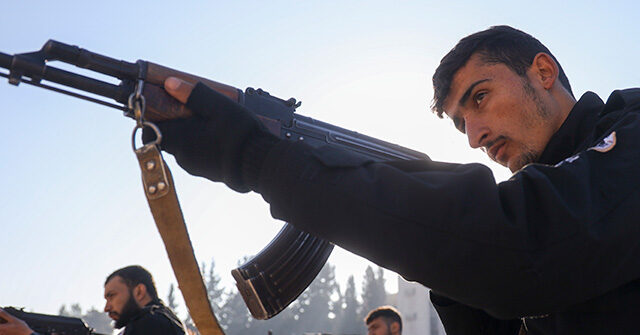Five senior police officers in Damascus told Reuters on Thursday they were using sharia to “instill a sense of morality” in new recruits during their brief training period. The officers insisted they were not training the police to impose sharia on citizens.
“There are many Syrians who will find this concerning. Not just minorities — Christians, Alawites, Druze — but also quite a lot of Sunni Muslims in places like Damascus and Aleppo, where you have a fairly large secular, cosmopolitan population that’s not interested in religious law,” Century International think tank fellow Aron Lund told Reuters.
Many of the new police in Damascus have been imported from Idlib, the province that served as the insurgents’ stronghold and launch pad for their lightning December offensive against the Assad regime.
Leading jihadi group Hayat Tahrir al-Sham (HTS), an offshoot of al-Qaeda, controlled Idlib for years. HTS created various military and civic institutions to administer its territory, including a police force. One of the officials who established the Idlib police academy, Hamza Abu Abdel Rahman, has been put in charge of the Damascus police.
Rahman said recruits needed training in Islamic law to understand “what is permissible and what is not” so they can “act justly.” This did not reassure Syrians who feared the police would become an Islamist goon squad.
HTS has not yet stated whether sharia would be written into the new constitution for Syria, but it has not ruled out the idea and it has said its government would be Islamist in character. The civilian administration HTS created in Idlib, the “Syrian Salvation Government,” had a Muslim ruling council that enforced strict sharia. High-ranking HTS members have cited the Taliban in Afghanistan as the model of government they would like to emulate.
On the other hand, the new Syrian government and its leader, former al-Qaeda commander Abu Mohammad al-Jolani (who has resumed using his birth name of Ahmed al-Sharaa), are eager to bring foreign money into Syria and avoid being ostracized like the Taliban. Fielding a reasonably professional police force would help to build the new regime’s international credibility.
Creating a better police force for Syria is a low hurdle to clear because Assad’s police were notoriously brutal and corrupt. Their depredations were a major factor in kicking off the protests of 2011 that grew into the Syrian civil war. Damascus residents made a point of trashing the city’s police stations after Assad fled the country in December. The victorious HTS rebels immediately dissolved Assad’s Interior Ministry, which controlled the police.
One Damascus official claimed over 200,000 applicants have asked to join the new police force, but some were dissuaded when told they would be trained in Islamic law.
“A 45-year-old Christian, who worked in Assad’s traffic police, said he wouldn’t apply for the new force even if he could. Speaking on condition of anonymity for safety reasons, he said he was worried that even people in lowly roles like his would be seen as part of Assad’s regime, and that the focus on Islamic law meant there would be discrimination against those of other faiths,” Reuters reported.
Divisions between Muslim sects could cause problems for the sharia-trained police force as well. About 70 percent of the Syrian population is Sunni Muslim, but Assad and his ruling elite were largely drawn from an offbeat Shiite Muslim sect known as the Alawites. The Alawites, who are concentrated in a few coastal cities, fear being persecuted by the new regime as Assad loyalists.
Three HTS officials admitted to Reuters that applicants to the police force are required to disclose their religious allegiance, and one reason is to single out Alawites for “closer scrutiny.” Other officials insisted Alawites will not be automatically disqualified from serving as police officers.
France24 reported last week that many of the police officers currently patrolling Damascus are simply HTS fighters wearing police uniforms. Some of those fighters, however, were former police officers who broke with the Assad regime to join the insurgency.
“We want security, freedom, and we don’t want authoritarian rule. We want decent salaries so we do not have to steal or take bribes to offer a good life to our families,” said one cop-turned rebel-turned cop.
Some Damascus residents told France24 that the HTS police force, while undermanned and stretched thin, has done a fairly good job of keeping order on the streets so far.
One other challenge facing the reconstructed Syrian police force is that unreconstructed Assad loyalists are still lurking in Syrian cities, and they may be receiving assistance from Assad’s old patrons in Iran. On Christmas Day, a band of Assad “remnants” ambushed and killed 14 police officers in the western city of Tartus.
Breitbart News
Read the full article .


